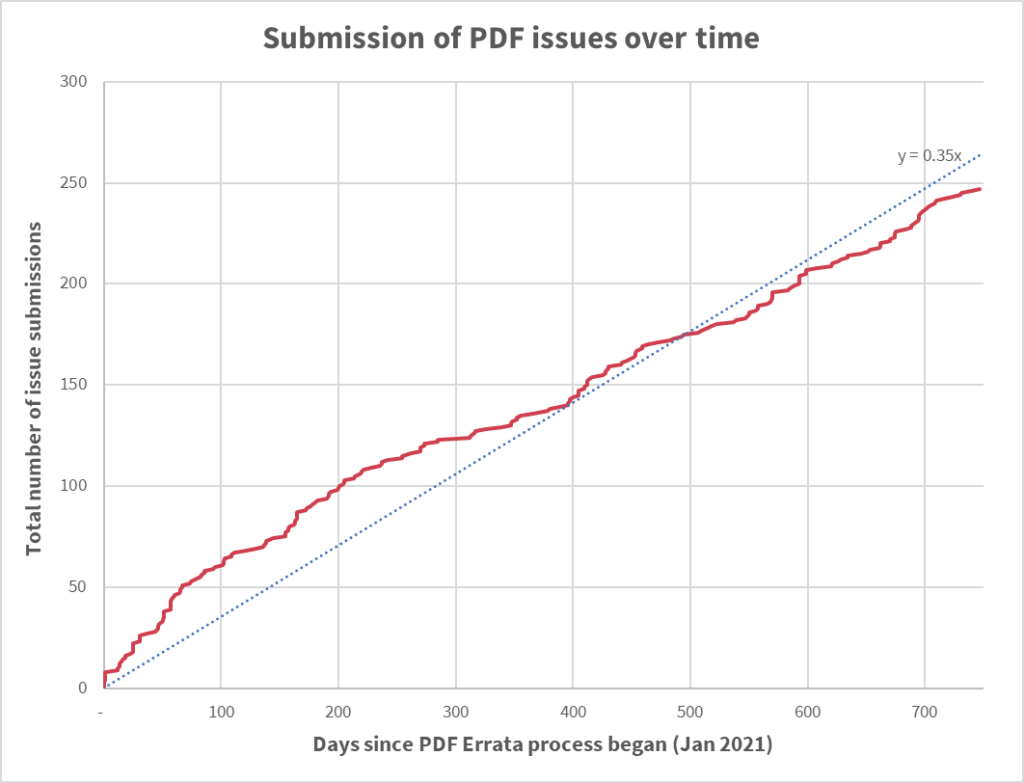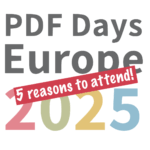An update on PDF errata

A developer and researcher working on PDF technologies for more than 20 years, Peter is the PDF Association’s CTO and an independent technology consultant.


It’s been 2 years since the PDF Association launched its public errata process for addressing issues with the PDF 2.0 core specification (ISO 32000-2:2020). As the PDF Association’s core mission is to deliver a vendor-neutral platform for developing open specifications and standards for PDF technology, we expanded the errata process to include the initial set of ISO standards for PDF based on PDF 2.0 (PDF/A-4, PDF/X-6, PDF/VT-3 and ECMAscript for PDF 2.0). We then broadened the scope further to support all ISO standards for PDF. More recently, we improved the usability of errata resolutions based on user feedback.
Let’s summarize some key outcomes thus far.
Open to all members, the PDF Association’s PDF Technical Working Group (TWG) has met approximately every 3 weeks to finalize those errata that have concrete suggestions for closure. We maintain this pace because ensuring timely closure of as many issues as possible benefits software developers everywhere. Within a few days of each PDF TWG meeting https://pdf-issues.pdfa.org is updated with the final resolution and the related GitHub issue is closed.
KEY TAKEAWAY: the PDF Association is actively committed to resolving issues and ambiguities in PDF for the benefit of the entire PDF ecosystem.
In the public errata process’s first two years a total of 247 issues were reported across numerous ISO standards for PDF technology with the majority reported against PDF 2.0, but including:
- 6 against ECMAscript for PDF 2.0 (ISO 21757-1:2020)
- 17 against PDF/A-4 (ISO 19005-4:2020)
- 11 against PDF/A-3 and PDF/A-2
- 14 against PDF/X-6 (ISO 15930-9:2020)
- 2 against PDF/UA-2 (ISO/DIS 14289-2:202x)
- 1 against the new ISO/TS 32001 extension to hash algorithm support in PDF 2.0
Note that due to common wording, sometimes a single issue impacts multiple publications.
KEY TAKEAWAY: members of the PDF Association are committed to resolving issues and ambiguities in PDF 2.0 and PDF’s ISO-standardized subsets for the benefit of the entire PDF ecosystem.
 Since the PDF errata process began in early Jan 2021 we see a relatively steady submission rate, with an issue reported approximately every 3 days, as indicated by the dotted linear trendline below. The initial bump in submissions was attributable, in part, to SafeDocs research.
Since the PDF errata process began in early Jan 2021 we see a relatively steady submission rate, with an issue reported approximately every 3 days, as indicated by the dotted linear trendline below. The initial bump in submissions was attributable, in part, to SafeDocs research.
KEY TAKEAWAY: PDF is a very complex technology! 30 years after its introduction technical stakeholders continue to find issues with PDF specifications. The PDF Association is committed to providing an open forum to allow every PDF developer to contribute towards a common technical understanding to ensure accurate and interoperable implementations.
As of the time of writing there are 181 closed issues and 66 open issues. Only 36 issues resulted in no action, primarily because the issue was a misunderstanding or already sufficiently addressed within ISO 32000-2:2020. Other reasons for a “no action” resolution included: duplication with another issue; the issue was really a new feature request, discussion item or enhancement for PDF (i.e. not an errata per-se).
KEY TAKEAWAY: 145 resolved issues represent a substantial body of industry-approved corrections, to the point that developers implementing PDF 2.0 would be entirely remiss in failing to refer to https://pdf-issues.pdfa.org!
Across all 181 closed issues, and noting that the PDF TWG only meets every 3 weeks, the average duration from issue submission to resolution was 46 days, with a median duration of just 31 days (1 month). 16 errata were fully resolved within 24 hours and a total of 31 errata (about 17%) were fully resolved within 7 days of submission! Closed errata came from 34 unique submitters.
KEY TAKEAWAY: the PDF Association’s errata process is agile and responsive to technical questions raised by PDF stakeholders.
92 of the resolved and closed issues were reviewed by ISO TC 171 SC 2 WG8 and will be included in the forthcoming ISO Amendment 1 to ISO 32000-2:2020. Amendment 1 will provide errata resolutions as an XFDF file, allowing these 92 corrections to be directly imported into your copy of ISO 32000-2:2020 enabling review in situ as “track changes”-style markup annotations.
KEY TAKEAWAY: the technical solutions to issues, as determined by PDF Association member experts within the errata process, are fully aligned with ISO.
All industry-resolved errata are reported to the appropriate ISO committees and working group at each ISO meeting. An additional 50 industry-resolved errata against ISO 32000-2:2020 have recently been passed to ISO TC 171 SC 2 WG 8 for their technical review at a specially convened meeting early in 2023. The PDF Association now adopts any improvements suggested by ISO contributors into the public errata resolution website at https://pdf-issues.pdfa.org, well ahead of any ISO publication.
KEY TAKEAWAY: the PDF Association’s agile and open errata process works upstream of ISO to freely provide rapid, public answers to issues raised against all actively maintained ISO standards for PDF technology.
About 11% of issues have had at least 10 interactions in the public GitHub pdf-issues system, with 35% of all issues having at least 5 interactions. One issue has had 53 interactions and still remains open as the community works towards a common understanding and resolution of complex issues.
KEY TAKEAWAY: Interactions with reported issues indicate a healthy and vibrant technical community collectively driving for a better PDF specification and better PDF interoperability.
As a result of this errata process and additional work done by the PDF Association’s PDF/A Technical Working Group, ISO TC 171 SC 2 WG 5 has commenced work on a dated revision of ISO 19005-4:2020 (PDF/A-4) to formally address ambiguities in this important specification.
KEY TAKEAWAY: The PDF Association’s errata process and technical leadership is a proven means of influencing the development and maintenance of ISO standards for PDF technology.
TL;DR
The open and agile errata process initiated by the PDF Association in January 2021 soon after the publication of PDF 2.0 (ISO 32000-2:2020) has proved to be very successful for PDF’s technical community.
You are welcome to join the PDF Association and participate in the PDF TWG to learn more about and contribute to industry processes for resolving technical ambiguities in the PDF file format.





